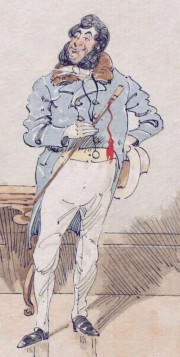|
Home
|
Apr 22, 2025
This week’s themeDickensian eponyms This week’s words Podsnap Turveydrop Stiggins pecksniff Artful Dodger 
Art: Kyd
A.Word.A.Day
with Anu GargTurveydrop
PRONUNCIATION:
MEANING:
noun: One who poses as a model of deportment: the way in which one conducts oneself.
ETYMOLOGY:
After Mr. Turveydrop, a character overly concerned with deportment, in
Charles Dickens’ Bleak House (1852). Earliest documented use: 1876.
The adjectival form is Turveydropian.
NOTES:
Mr. Turveydrop owns a dance school where he forces his son to do
all the work while he parades around taking all the credit. As Dickens
describes Turveydrop: “He was a fat old gentleman with a false complexion,
false teeth, false whiskers, and a wig. ... He had everything but any
touch of nature; he was not like youth, he was not like age, he was not
like anything in the world but a model of deportment.” In short, he was deportment without depth, a walking, talking showroom dummy for etiquette. The word deport here means to behave or conduct oneself, especially in a dignified manner. The other sense of deport, to evict from a country, is a later development. Both are from Latin portare (to carry). USAGE:
“Rose: ‘But gentlemen don’t catch up ladies like bags of meal, and poke them
into carriages in this way. It is evident that you need looking after,
and it is high time I undertook your society manners. Mac: ‘I’ll behave like a Turveydrop: see if I don’t.’” Louisa May Alcott; Rose in Bloom; Roberts Brothers; 1876. A THOUGHT FOR TODAY:
On this 4th [of July], look beyond fireworks, parades, and pretentious
patriots. Instead, celebrate whistleblowers and lamplighters who warn the
people, speak truth to power -- risking their lives and fortunes defending
our inalienable rights and independence against those who take our
liberties away. -Thomas Drake, veteran and whistleblower (b. 22 Apr 1957)
|
|
Subscriber Services
Awards | Stats | Links | Privacy Policy
Contribute | Advertise
Awards | Stats | Links | Privacy Policy
Contribute | Advertise
© 1994-2026 Wordsmith